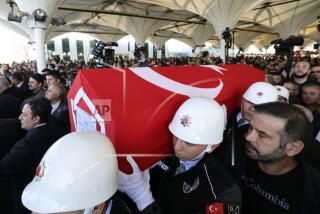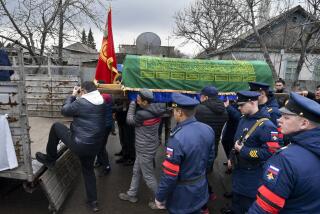Questions and Answers on Kurds and Their Struggles
Kurdish rebel leader Abdullah Ocalan’s futile search for a new base and his return to Turkey mark a new chapter in the Kurdish conflict. Some key facts about the Kurdish problem:
Q: Who are the Kurds and how many are there?
A: There are 20 million to 25 million Kurds in Turkey, Syria, Iran, Armenia and Iraq. About 12 million live in Turkey, most in the poor southeastern region. Kurds share a common language, related to Iranian, and are overwhelmingly Sunni Muslims.
*
Q: What is the legal status of Kurds in Turkey?
A: Kurds are not recognized in Turkey as a minority--unlike Greeks, Armenians, Assyrians and Jews. Recognized minorities have the right to teach in their respective languages.
*
Q: What rights do Kurds have in Turkey?
A: A ban imposed by Turkey’s last military government on the use of Kurdish in unofficial settings was lifted in 1991, but Kurdish is illegal in broadcasts and educational or political settings. A court case to ban Turkey’s main pro-Kurdish party is underway.
*
Q: What about the Kurds in Iraq?
A: After Iraq was defeated in the Persian Gulf War, Kurdish guerrillas seized several key towns in northern Iraq. Baghdad put down the rebellion, sending about 2 million Kurds fleeing to Iran and Turkey; thousands died of exposure in the mountains. The United States, Britain and France then established a “safe haven” for the Kurds in northern Iraq. In 1994, the two main Kurdish factions began battling each other, leaving about 2,000 dead before the United States mediated a cease-fire in August 1995. A year later, the fighting resumed. The United States failed to broker a peace between the two groups, then stood by as more than 30,000 of Iraqi President Saddam Hussein’s troops marched on the Kurds’ designated northern capital, Irbil.
*
Q: When did the Kurdish independence movements begin?
A: Kurds were promised a homeland in the 1920 Treaty of Sevres, which carved up Turkey after the collapse of the Ottoman Empire. Kemal Ataturk, the founder of modern Turkey, fought to regain the land, destroying plans for a Kurdish state. There have been numerous Kurdish revolts since.
*
Q: When was the Kurdistan Workers Party, or PKK, created, and what are its aims?
A: The PKK was established in 1978 and turned to armed struggle in 1984. Having originally fought for independence, the group now says it aims for an autonomous Kurdish state or a federation with Turkey.
*
Q: What’s the toll of the conflict?
A: About 30,000 people have died. The PKK has waged a guerrilla war in the southeastern mountains and carried out attacks in western Turkey and Europe.
*
Q: Will the PKK survive after its leader’s capture?
A: Ocalan’s capture is a major blow to the PKK. The group might fall into internal conflicts and face a leadership struggle. More radical activists might opt for intensifying the armed struggle. Moderates might choose to concentrate on a political solution.
*
Q: How does Turkey answer accusations that it discriminates against Kurds?
A: Turkey insists that Turks and Kurds are equal and points to success stories of Kurds, including the late President Turgut Ozal and parliamentary Speaker Hikmet Cetin.
More to Read
Sign up for Essential California
The most important California stories and recommendations in your inbox every morning.
You may occasionally receive promotional content from the Los Angeles Times.










